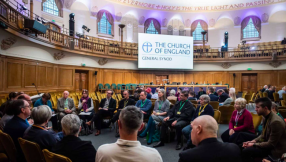
Music has often proved a contentious issue in church life, and so it came as no surprise to hear that Sheffield Cathedral's decision to shut down its choir in favour of a more inclusive music team has provoked a backlash. The Save Sheffield Cathedral Choir group, it would appear, is seeking independent legal advice over that decision and may pursue legal action.
When I read this, I couldn't help thinking that the apostle Paul would have been horrified to hear it. Now, I am not trying to belittle the distress the group is experiencing. I sympathise with everyone involved in this painful dispute, not least those who stand to lose their jobs and potential scholarships. But legal action against fellow believers? When I reflect on what the apostle Paul has said, I can only think that it has to be a no-go area for Christians.
When we read Paul's first letter to the Corinthians, it is obvious that some church members were contemplating going to law with each other and I reckon it is difficult to read Paul's response without seeing it as a stinging rebuke (I Corinthians 6).
Paul is not naïve. He knows that disputes will occur. Human nature and behaviour make that inevitable. But his very first words on the subject make it abundantly clear that they shouldn't be behaving like this.
"When one of you has a dispute with another believer," he writes, "how dare you file a lawsuit and ask a secular court to decide the matter instead of taking it to other believers."
The word 'dare' is a strong one and underlines the sense of shock and horror he must have been feeling. As a devout Jew, Paul would have been brought up to believe that seeking redress in secular courts was simply not acceptable. Indeed, the late New Testament scholar Leon Morris quotes Rabbi Tarfon in the Talmud, who used to say, "In any place where you find heathen law courts, even though their law is the same as the Israelite law, you must not resort to them."
But Paul's sense of horror cannot be explained by his traditional Jewish background only. As he saw it, their behaviour was a contradiction of the Christian way of love. The Greek Philosopher Plato argued that the good man would prefer to suffer wrong than do wrong, but Paul took this much further and said that "going to law" was an admission of defeat. His words are remarkably challenging. "Why not just accept the injustice and leave it at that?" he says. "Why not let yourselves be cheated?"
I have no idea if the Save Sheffield Cathedral Choir group is correct when it talks of "spurious claims" and "cynical timing". They may or may not be right in asserting that. The pain felt by the Sheffield Choir Group is very obvious and that should make us all sad. But Paul's teaching clearly suggests that even a legal victory can be nothing more than a spiritual defeat because you lose the moment you decide to go to court.
Paul goes one step further too because he reminds the early believers that as members of God's family, they should be able to settle such issues within the church family. After all, he says, if you are going to judge angels you are surely capable of sorting things out now. "I am saying this to shame you," he writes. "Isn't there anyone in all the church who is wise enough to decide these issues?"
We should pray for those who are caught up in this painful conflict of interests, and as we do so, I think we should ask the Lord to raise up someone who can help both sides reach an amicable settlement. The church gets more than enough negative coverage in the press as it is.
Rob James is a Baptist minister, writer and church and media consultant to the Evangelical Alliance Wales. He is the author of Little Thoughts About a Big God.
Views and opinions published in Christian Today are those of the authors and do not necessarily reflect the views of the website.













